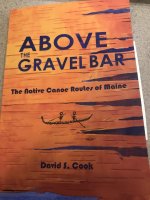-
Happy National Audubon Day! 🐣🐦🦅🕊️
You are using an out of date browser. It may not display this or other websites correctly.
You should upgrade or use an alternative browser.
You should upgrade or use an alternative browser.
What are you reading?
- Thread starter roadends
- Start date
Haven't read them yet. They are on the way from Amazon...
"Paddling the Western Maine Mountains" by Doug Dunlap
and
"Canoe Trip: Alone in the Maine Wilderness" by David Curran
I'm looking forward to both of them.
"Paddling the Western Maine Mountains" by Doug Dunlap
and
"Canoe Trip: Alone in the Maine Wilderness" by David Curran
I'm looking forward to both of them.
"Ravens in Winter", by Bernd Heinrich. What can I say, I'm an ex-wildlife biologist. And I love watching the magpies in the yard. For you Easterners, the work was done in Maine.
A History Of Canada in Ten Maps by Adam Shoalts. Mostly about historic map making. Enjoyable if your into that kind of thing.
Bob
Bob
@Mason Your comment above stirred up the sludge in my memory banks. A few years ago I read "A Year in the Maine Woods" also by Bernd Heinrich. In it he spends a lot of time writing about the Ravens. That was probably where he got the info for "Ravens in Winter"."Ravens in Winter", by Bernd Heinrich. What can I say, I'm an ex-wildlife biologist. And I love watching the magpies in the yard. For you Easterners, the work was done in Maine.
He's got a number of books out--I think Ravens in Winter is the first (1988 or so). Also "The Mind of the Raven". Good writer, especially for a biologist (!).@Mason Your comment above stirred up the sludge in my memory banks. A few years ago I read "A Year in the Maine Woods" also by Bernd Heinrich. In it he spends a lot of time writing about the Ravens. That was probably where he got the info for "Ravens in Winter".
I just read Alone Against the North by Shoalts and found it completely off-putting. I realize it's a young person's book, so perhaps some things can be forgiven, but his non-stop adoration for explorers throughout history (which demands a more nuanced take in this day and age), his constant put downs of his traveling companion, his lack of acknowledgement of indigenous land use/knowledge, and his constant amplification of the dangers of his travels was insufferable....having said that, being alone on the coast of Hudson Bay amidst Polar Bears requires some intestinal fortitude that I wouldn't willingly choose to muster....A History Of Canada in Ten Maps by Adam Shoalts. Mostly about historic map making. Enjoyable if your into that kind of thing.
Bob
Tomo- I actually didn’t finish it. It started off well enough, but I got bored. I’m sure I will get back to it out of desperation at some point. I have not read anything else by him.
Bob
Bob
For my birthday my wife got me ‘The Willets Brothers and their Canoes’ . I haven’t started it yet but but looking forward to it.
Jim
Jim
Three books in progress at the same time. How the heck did that happen? Fortunately, I am unlikely to get them confused.
David C. Holly, Chesapeake Steamboats: The Vanished Fleet. A history of steam navigation on Chesapeake Bay, beginning with the technological marvels of the early 19th Century. Holly details the advances in engineering and cutthroat competition of the early steamboat lines. Notable steamboat wrecks are covered, up to the 1991-92 discovery and recovery of the engine of Columbus, built in 1828 and wrecked in 1850. Steamboats played a prominent role in the Civil War, including the capture of a Baltimore steamer by Confederate raider Richard. Zarvona, aka “The French Lady.” Steamboats were the primary and essential means of passenger and freight transport around the Bay for 150 years, until their demise in the mid-20th Century.
Joshua Hammer, The Falcon Thief: A True Tale of Adventure, Treachery, and the Hunt for the Perfect Bird. In 2010, Jeffrey Lendrum was arrested at a British airport en route to Dubai, with 14 rare peregrine falcon eggs strapped to his body. The book tells the history of falconry in the Middle East, and explains how oil money led to a profitable illegal trade in endangered species.
Garrett and Alexandra Conover, Snow Walker's Companion: Winter Trail Skills from the Far North. Sitting here in Virginia, with 8 inches of snow on the ground and a 25 degree temperature, it's hard to imagine living comfortably in country with 8 feet of snow and a temperature of minus 25. The Conovers tell how to do it, with an emphasis on traditional Native American winter skills and gear. Snowshoes, toboggans, heated tents, and nutritious food are covered. Patterns for anoraks, mukluks, mittens, and tents are included. A highlight of the book is the Conovers' journal of their 58 day, 300 mile winter journey on foot across the Ungava Peninsula.
David C. Holly, Chesapeake Steamboats: The Vanished Fleet. A history of steam navigation on Chesapeake Bay, beginning with the technological marvels of the early 19th Century. Holly details the advances in engineering and cutthroat competition of the early steamboat lines. Notable steamboat wrecks are covered, up to the 1991-92 discovery and recovery of the engine of Columbus, built in 1828 and wrecked in 1850. Steamboats played a prominent role in the Civil War, including the capture of a Baltimore steamer by Confederate raider Richard. Zarvona, aka “The French Lady.” Steamboats were the primary and essential means of passenger and freight transport around the Bay for 150 years, until their demise in the mid-20th Century.
Joshua Hammer, The Falcon Thief: A True Tale of Adventure, Treachery, and the Hunt for the Perfect Bird. In 2010, Jeffrey Lendrum was arrested at a British airport en route to Dubai, with 14 rare peregrine falcon eggs strapped to his body. The book tells the history of falconry in the Middle East, and explains how oil money led to a profitable illegal trade in endangered species.
Garrett and Alexandra Conover, Snow Walker's Companion: Winter Trail Skills from the Far North. Sitting here in Virginia, with 8 inches of snow on the ground and a 25 degree temperature, it's hard to imagine living comfortably in country with 8 feet of snow and a temperature of minus 25. The Conovers tell how to do it, with an emphasis on traditional Native American winter skills and gear. Snowshoes, toboggans, heated tents, and nutritious food are covered. Patterns for anoraks, mukluks, mittens, and tents are included. A highlight of the book is the Conovers' journal of their 58 day, 300 mile winter journey on foot across the Ungava Peninsula.
- Joined
- Jul 6, 2021
- Messages
- 643
- Reaction score
- 562
Bob, the county library system did not have one, and I love geography and map books, so I bought a copy.
 P1080011 by Mike McCrea, on Flickr
P1080011 by Mike McCrea, on Flickr
Started it last night – by Luci Light, we lost power for 9 hours – and am already very pleased with the content and writing style. One son has already called dibs when I am finished.
Thanks Bob, the last book I read was topic enthralling and syntax (or something) disappointing. A Christmas gift, one of many books family gifted last year, Rivers of Power; How a Natural Force Raised Kingdoms, Destroyed Civilizations and Shapes Our World (Laurence Smith, 2020)
https://www.goodreads.com/book/show...arch=true&from_srp=true&qid=kqlp0Shwq3&rank=1
It isn’t bad, and is worth a read, but something about Smith’s syntax was more a scholarly slog than lite fare turn-a-page reading. The history and geography parts were intriguing if familiar; pages and pages about starving flood plains and silt build up behind dams became tedious.
His take on the development advantage in the US of many inter-connected, goods transportable rivers, versus much of the rest of the world, was something I had not fully considered.
T’was Manifest Destiny I tell ya.
 P1080011 by Mike McCrea, on Flickr
P1080011 by Mike McCrea, on FlickrStarted it last night – by Luci Light, we lost power for 9 hours – and am already very pleased with the content and writing style. One son has already called dibs when I am finished.
Thanks Bob, the last book I read was topic enthralling and syntax (or something) disappointing. A Christmas gift, one of many books family gifted last year, Rivers of Power; How a Natural Force Raised Kingdoms, Destroyed Civilizations and Shapes Our World (Laurence Smith, 2020)
https://www.goodreads.com/book/show...arch=true&from_srp=true&qid=kqlp0Shwq3&rank=1
It isn’t bad, and is worth a read, but something about Smith’s syntax was more a scholarly slog than lite fare turn-a-page reading. The history and geography parts were intriguing if familiar; pages and pages about starving flood plains and silt build up behind dams became tedious.
His take on the development advantage in the US of many inter-connected, goods transportable rivers, versus much of the rest of the world, was something I had not fully considered.
T’was Manifest Destiny I tell ya.
Never heard of Anne LaBastille, but I guess I'll have to put her on the list.

 www.adventure-journal.com
www.adventure-journal.com

Anne LaBastille May Have Out-Thoreau'd Thoreau
The blonde Daisy Duke-wearing, tough-as-nails mountain woman charmed and inspired.
Ordinary Wolves by Seth Kantner
This novel reads like a biography and immerses you in a world that few have experienced; growing up in an Inupiaq bush village in Alaska. Not a romanticized vision, but the gritty truth of it. I call it a chewy book because i read a chapter or two and then have to chew on it, digest it a bit. The imagery and insights into human nature evoke emotions that I must inspect before moving on. I really can't recomend it highly enough.
Best,
Monel

This novel reads like a biography and immerses you in a world that few have experienced; growing up in an Inupiaq bush village in Alaska. Not a romanticized vision, but the gritty truth of it. I call it a chewy book because i read a chapter or two and then have to chew on it, digest it a bit. The imagery and insights into human nature evoke emotions that I must inspect before moving on. I really can't recomend it highly enough.
Best,
Monel

- Joined
- Nov 30, 2017
- Messages
- 810
- Reaction score
- 743
Deep Survival by Laurence Gonzalez: Who lives, who dies and why.
I just reread this book and it has a lot to say to those of us who head into the wilderness. It covers some neurobiology and how the various parts of the brain work together, or not, and how that impacts decision making in emergency situations. Some of the situations involve river running. Others include fire fighting, war, mountain climbing, hiking.
I just reread this book and it has a lot to say to those of us who head into the wilderness. It covers some neurobiology and how the various parts of the brain work together, or not, and how that impacts decision making in emergency situations. Some of the situations involve river running. Others include fire fighting, war, mountain climbing, hiking.
My wife brought this book home the other day. I'll be reading it when she's done, and then sending it to my kid for him to read.Deep Survival by Laurence Gonzalez: Who lives, who dies and why.
I just reread this book and it has a lot to say to those of us who head into the wilderness. It covers some neurobiology and how the various parts of the brain work together, or not, and how that impacts decision making in emergency situations. Some of the situations involve river running. Others include fire fighting, war, mountain climbing, hiking.
I’ve just started ‘An Adirondack Passage’ by Christine Jerome.
Jim
Jim
Just finished it- great book. Thanks for mentioning it.Deep Survival by Laurence Gonzalez: Who lives, who dies and why
Bob
Similar threads
- Locked
- Replies
- 24
- Views
- 2K
- Replies
- 31
- Views
- 2K



